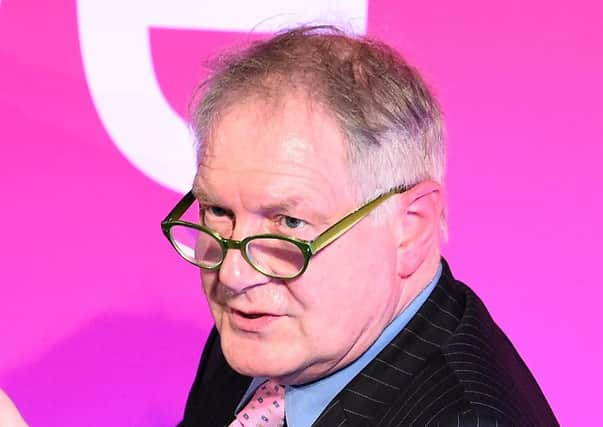Ex-Army colonel: Roy Greenslade ‘insults the memories of police and soldiers’ killed in Northern Ireland


Greenslade has faced scathing criticism as someone who lectures students in media ethics – having written material backing the republican movement, under false names, while also writing for mainstream media publications that were outspoken in their opposition to terrorist violence.
Richard Kemp, a former army colonel and chairman of the government’s Cobra Intelligence Group, said: “My concern... is what appears to be his attempt to rewrite the history of the Troubles, and to insult the memory of those who died trying to stop the violence.
Advertisement
Hide AdAdvertisement
Hide Ad“In his article in the British Journalism Review, Mr Greenslade explains his conversion to republicanism took place in part on the basis of what he heard about ‘the security forces’ use of collusion, the deliberate failure by the authorities to act quickly enough in response to phone calls warning of bomb placements, and the willingness of the RUC and army to allow loyalist paramilitaries to bomb and kill with impunity.’
“But what Mr Greenslade says he heard was a shocking distortion of the truth, and he should be ashamed of himself for believing it. He insults the memory of the police and the soldiers who were killed.”
In the British Journalism Review last week, Greenslade revealed how he was a “messenger” who backed the republican cause.
“I wanted peace and played a very minor role as messenger at a crucial moment during the process itself. But I understand why the conflict occurred and do not regret my support for those who fought it. I am pleased at last to come out from hiding and explain myself to everyone,” he said.
Advertisement
Hide AdAdvertisement
Hide AdHowever, in a Daily Telegraph article, Mr Kemp has described Greenslade’s views about the actions of security services as “not only naive or wrong... but dangerous,” and added: “They are of a kind with the propaganda of dissident republican groups who maintain the campaign of violence.”
The Guardian has now said it will be “reviewing” historical Roy Greenslade articles concerning Northern Ireland, “to ensure that they meet the Guardian’s editorial standards and are sufficiently transparent”.
Asked by the Press Gazette whether his views on terrorism disqualified him from teaching ethics, Greenslade said via email: “The furore underlines the main point of my article: to have come clean in the 1970s with my beliefs would have rendered me unemployable.
“I did nothing more than the scores of journalists who keep their political views to themselves. My opinions did not affect my journalistic work, nor did they affect my university teaching.
Advertisement
Hide AdAdvertisement
Hide Ad“As many of my more attentive students would surely recall, I was open about being a republican.”
In 2014, Greenslade published an article in the Guardian following a BBC Spotlight programme on Mairia Cahill’s alleged rape (when aged 16) by an alleged IRA member, and her subsequent “interrogation” by senior IRA figures when she complained.
Greenslade’s column complained that the programme-makers “were too willing to accept Cahill’s story and did not point to countervailing evidence”.
He wrote: “This lack of balance resulted in the Cahill story being accepted at face value across Ireland, where [Gerry] Adams and his party were forced on to the back foot as they tried to defend and explain the IRA’s actions.”
Advertisement
Hide AdAdvertisement
Hide AdIn response to those claims, the BBC has said: “The BBC stands by a significant piece of investigative journalism which was in the public interest.”
Five people were prosecuted as a result of Ms Cahill’s claims but were later acquitted of all charges after she withdrew her evidence.
On Twitter on Wednesday, Sinn Fein press officer Seán Mag Uidhir said: “Will journalists and media defend Mr Greenslade’s right to free speech? Or do they believe that the censorship of the ‘70s, ‘80s and ‘90s should be retrospectively applied in 2021?”
Máiría Cahill responded by tweeting: “Not about censorship. It is about standing over pieces written with motive, without declaring that motive, which now skews everything he has written which potentially had a conflict of interest.”
Advertisement
Hide AdAdvertisement
Hide AdFormer senior Northern Ireland police officer and child protection expert Jim Gamble tweeted his own response. He said: “This isn’t about censorship it is about integrity.”
A message from the Editor:
Thank you for reading this story on our website. While I have your attention, I also have an important request to make of you.
Advertisement
Hide AdAdvertisement
Hide AdWith the coronavirus lockdown having a major impact on many of our advertisers — and consequently the revenue we receive — we are more reliant than ever on you taking out a digital subscription.
Subscribe to newsletter.co.uk and enjoy unlimited access to the best Northern Ireland and UK news and information online and on our app. With a digital subscription, you can read more than 5 articles, see fewer ads, enjoy faster load times, and get access to exclusive newsletters and content. Visit https://www.newsletter.co.uk/subscriptions now to sign up.
Our journalism costs money and we rely on advertising, print and digital revenues to help to support them. By supporting us, we are able to support you in providing trusted, fact-checked content for this website.
Alistair Bushe
Editor